
|
Astronomy Picture Of the Day (APOD)
 The Cats Eye Nebula
The Cats Eye Nebula
3.07.2016
Three thousand light-years away, a dying star throws off shells of glowing gas. This image from the Hubble Space Telescope reveals the Cat's Eye Nebula to be one of the most complex planetary nebulae known.
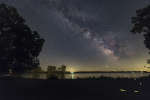 Firefly Trails and the Summer Milky Way
Firefly Trails and the Summer Milky Way
2.07.2016
A camera fixed low to a tripod on a northern summer's eve captured the series of images used in this serene, southern Ontario skyscape. The lakeside view frames our fair galaxy above calm water and the night's quintessential luminous apparitions.
 Juno Approaching Jupiter
Juno Approaching Jupiter
1.07.2016
Approaching over the north pole after nearly a five-year journey, Juno enjoys a perspective on Jupiter not often seen, even by spacecraft from Earth that usually swing by closer to Jupiter's equator. Looking...
 The New World Atlas of Artificial Sky Brightness
The New World Atlas of Artificial Sky Brightness
30.06.2016
How far are you from a naturally dark night sky? In increasing steps, this world map (medium | large) shows the effect of artificial night sky brightness on the visual appearance of the night sky. The brightness was modeled using high resolution satellite data and fit to thousands of night sky brightness measurements in recent work.
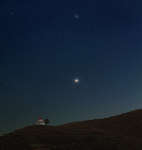 From Alpha to Omega in Crete
From Alpha to Omega in Crete
29.06.2016
This beautiful telephoto composition spans light-years in a natural night skyscape from the island of Crete. Looking south, exposures both track the stars and record a fixed foreground in three merged panels that cover a 10x12 degree wide field of view. The May 15 waxing gibbous moonlight illuminates the church and mountainous terrain.
 Juno Mission Trailer
Juno Mission Trailer
28.06.2016
What will NASA's Juno spacecraft find when it reaches Jupiter next Monday? Very little, if Juno does not survive Jupiter Orbit Insertion, a complex series of operations in an unknown environment just above Jupiter's cloud tops.
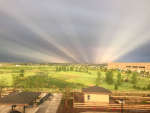 Anticrepuscular Rays over Colorado II
Anticrepuscular Rays over Colorado II
27.06.2016
What's happening over the horizon? Although the scene may appear somehow supernatural, nothing more unusual is occurring than a setting Sun and some well placed clouds. Pictured above are anticrepuscular rays. To understand them, start by picturing common crepuscular rays that are seen any time that sunlight pours though scattered clouds.
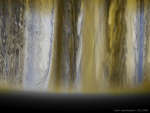 Jupiters Clouds from New Horizons
Jupiters Clouds from New Horizons
26.06.2016
The New Horizons spacecraft took some stunning images of Jupiter on its way out to Pluto. Famous for its Great Red Spot, Jupiter is also known for its regular, equatorial cloud bands, visible through even modest sized telescopes.
 Strawberry to Honey Moonrise
Strawberry to Honey Moonrise
25.06.2016
Near the horizon the Full Moon often seems to loom large, swollen in appearance by the famous Moon illusion. But timelapse images demonstrate that the Moon's apparent size doesn't really change as it climbs toward the zenith. Its color does, though.
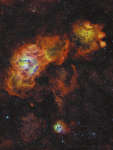 Sagittarius Sunflowers
Sagittarius Sunflowers
24.06.2016
These three bright nebulae are often featured in telescopic tours of the constellation Sagittarius and the crowded starfields of the central Milky Way. In fact, 18th century cosmic tourist Charles Messier cataloged...
|
January February March April May June July August September October November December |
|||||||||||||||||||||||||||||||||||||||||||||||||